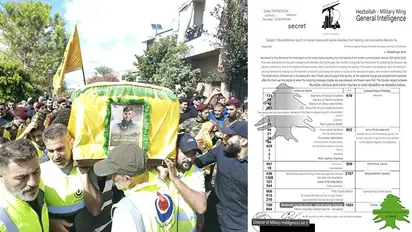Lebanon: Leaked document reveals 879 Hezbollah members killed in pager, walkie-talkie explosions; details here

Synopsis
A shocking internal document from Hezbollah’s military intelligence has revealed that 879 members of the organization have died due to a series of explosions involving pagers and walkie-talkies in Lebanon.
A shocking internal document from Hezbollah’s military intelligence has revealed that 879 members of the organization have died due to a series of explosions involving pagers and walkie-talkies in Lebanon. The document, leaked from the office of Hezbollah's military intelligence chief, outlines devastating figures that point to a significant blow to the group, which is considered one of the most powerful military and political forces in the region.
According to the leaked intelligence report:
- 879 Hezbollah members were confirmed dead.
- Among the deceased, there were 131 Iranians and 79 Yemenis.
- The fatalities included 291 senior commanders of the group.
- In addition to those killed, 509 members were blinded, with 491 reported as completely blind.
- The explosions also resulted in 1,735 injuries to reproductive organs, with 906 classified as total damage and 613 sustaining permanent functional damage.
The document suggests that the explosions resulted from a breach of Hezbollah’s internal communication network, raising questions about the security measures within the organization.
The initial reports from Hezbollah cited only twelve fatalities and about 3,000 injuries, making the revelations from the intelligence document particularly alarming. The attacks, which involved simultaneous detonations of pagers and two-way radios, have been described by Hezbollah leader Hassan Nasrallah as an "act of war" perpetrated by Israel, vowing retaliation.
Nasrallah stated, “They will face a severe reckoning,” emphasizing the unprecedented damage inflicted on both Lebanon and Hezbollah. The leader's comments came amid intensified military activities along the Lebanon-Israel border, indicating a potential escalation in the ongoing conflict.
While Israeli officials have not confirmed responsibility for the attacks, US intelligence has indicated that Israel was involved in orchestrating the explosions. The operation is believed to have been conducted by the Israeli intelligence agency, Mossad, which is known for its precision-targeted operations abroad.
Following the attacks, Israeli military officials announced a new phase of operations along the northern border, escalating airstrikes in southern Lebanon. Reports indicate that more than 50 strikes were carried out late Thursday, marking a significant increase in military engagement.
In the aftermath of the explosions, residents in areas supportive of Hezbollah expressed feelings of vulnerability and insecurity. The attacks have disrupted normal life and heightened tensions within communities that once felt protected. Frustrations are growing among supporters, who are demanding a decisive response from Hezbollah leadership.
Health officials reported that the explosions severely strained Lebanon’s already fragile healthcare system, with numerous casualties flooding hospitals across the nation. The World Health Organization's head noted that the blasts posed a significant challenge to medical resources already stretched by ongoing conflicts in the region.
Check the Breaking News Today and Latest News from across India and around the world. Stay updated with the latest World News and global developments from politics to economy and current affairs. Get in-depth coverage of China News, Europe News, Pakistan News, and South Asia News, along with top headlines from the UK and US. Follow expert analysis, international trends, and breaking updates from around the globe. Download the Asianet News Official App from the Android Play Store and iPhone App Store for accurate and timely news updates anytime, anywhere.